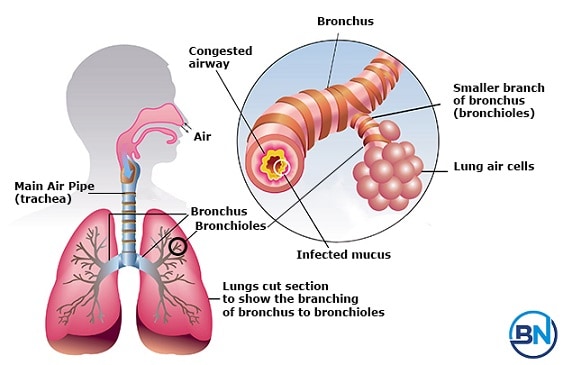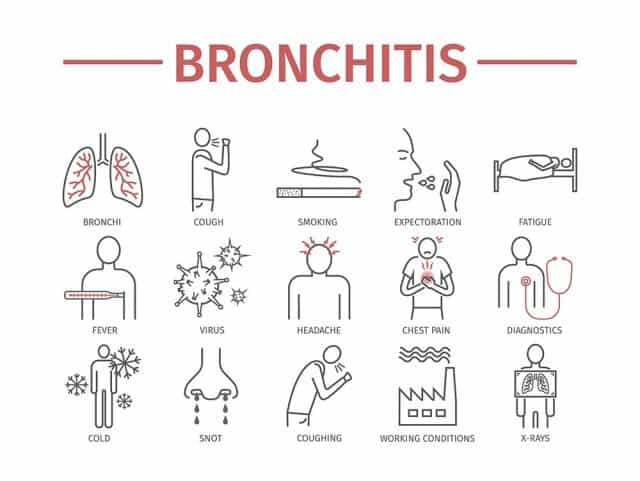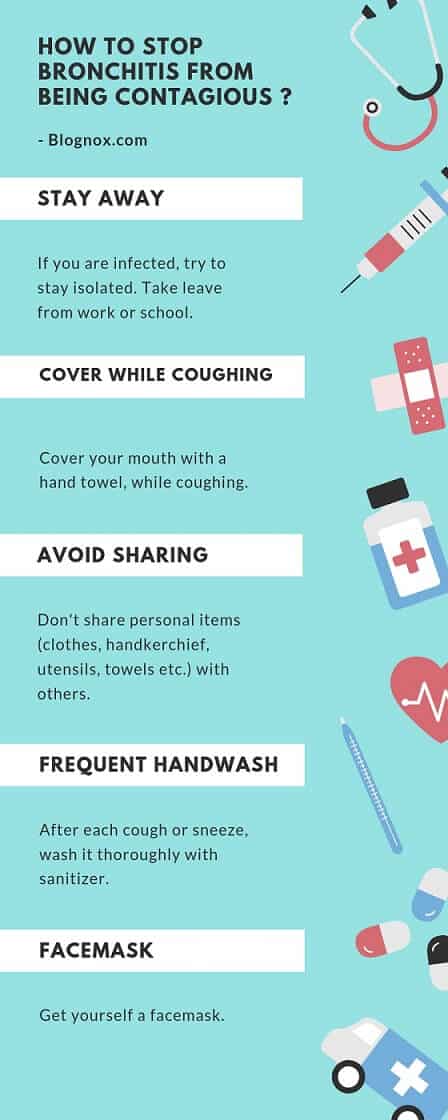Is bronchitis contagious? Yes, but not all type of Bronchitis.
Only acute viral bronchitis is contagious. It transmits through coughing, sneezing, hand-holding or kissing.
It may catch others even after taking antibiotics.
Let’s discuss the causes and symptoms briefly.
Table of Contents
What is Bronchitis
Bronchitis is a medical condition, where a cough lasts more than 2 weeks due to swelling of the bronchial tubes.
The swelling is either due to an allergic reaction or inflammation as a result of infection.
Excess of mucus is released from the glands, which thickens and blocks the air passage, consequently making it difficult to breathe.
Since the mucus plugs do not clear themselves up in the respiratory tract, it can complicate the situation further by letting the microbes proliferate at a much faster rate.
Is Bronchitis Contagious
We have said earlier that all type of bronchitis is not contagious.
Chronic Bronchitis isn’t contagious. But Acute Bronchitis is contagious, as it is caused by viruses.
Let’s understand these 2 variants of Bronchitis infection.
1. Chronic Bronchitis:
In Chronic Bronchitis, your breathing irritation comes back several times.
This type of bronchitis tends to last at least some months or maybe longer. It might also return after once infecting a patient.
Things that might irritate your lungs such as chemicals, smoke, dust, cigarettes, and fire might heighten the condition.
It isn’t contagious one but might require the expertise of a doctor to treat the condition for relief.
2. Acute Bronchitis:
Acute Bronchitis can trouble you for a week or 3. It is caused by flu or cold viruses.
All viruses tend to be contagious, so is Acute Bronchities.
That’s why any patient suffering from acute bronchitis should immediately seek help from a doctor to avoid infecting anyone else.
How long is bronchitis contagious
Chronic Bronchitis is not contagious. Moreover, It never goes away permanently.
But, Acute Bronchitis may stay for a couple of weeks. There are several viruses, similar to the cold virus, that can cause it.
Even if the viral attack is over, you may suffer from a cough and cold. And like all other cough viruses, acute bronchitis may also transmit through a cough.
So, it is safe to assume that it may transmit, as long as the symptoms are there.
Is Bronchitis Contagious after taking antibiotics
Acute bronchitis is contagious even after taking antibiotics.
You may start recovering after going through antibiotic medication. But, frequent coughing will continue for further few days.
Through a cough, the virus will spread out from nose or mouth. It can easily catch a nearby person.
Antibiotics will treat the disease. But, the risk of transmission is there still the symptoms exist.
Is Bronchitis Contagious through kissing
Offcourse. Viral bronchitis is contagious through kissing.
This virus transmits through saliva and skin-to-skin contact.
It’s better to avoid close contact as long as coughing continues.
But, bronchitis due to smoking or pollution is not contagious. This type of chronic bronchitis will not catch through kissing.
What are the causes of Bronchitis
In a way to prevent it, you need to know the causes first.
1. Microbial attack:
Viruses such as Influenza virus and Rhinovirus are the main causative organisms for initiation of conditions which upshot bronchial inflammation.
An inflamed or damaged tissue is susceptible to attacks by other pathogens, in this case especially by bacteria.
Different strains of bacteria as Mycoplasma, Bordetella, Chlamydia, etc. look upon for an opportunity to infect.
2. Active or passive smokers:
Cigarette smoking not only damages the elasticity of the lungs and deposits toxic chemicals in the smoker’s body but badly affects the person around him too.
A damaged tissue and reduced effective immune system make a person prone to Bronchitis. Smoking is definitely the most hostile cause for bronchitis.
Further Read: COPD – Smoker’s Lung.
3. Lung disorders:
Chronic lung disorders like Cystic fibrosis, where cilia lining the lungs are unable to flush out mucus, thus resulting in accumulation of mucus layers.
The thickened mucous build up and sets up the vulnerability for bronchitis. COPD, asthmatic patients, bronchiectasis forbearers are often the victims of this disease.
4. Gastric Reflux:
Gastric Reflux isn’t limited to stomach issues.
The repeated bouts that come with severe heartburns might actually irritate the throat while making you highly prone to the development of bronchitis.
It is generally advised that you consume food with high fiber content such as oats and green leafy vegetable and refrain from a diet that might contain too heavy oil content or spices that might irritate your stomach leading to gastric reflux.
5. Irritant Exposure at Job:
Your risk for development of bronchitis increases substantially when your job profile is aligned around the irritants that might affect your lungs such as textiles, chemical fumes, and grains.
It is advised that you use a proper quality mask to suppress the risk from exposure to lung irritants that might contribute to bronchitis.
6. Low Immunity
Having low resistance to diseases such as cold or any chronic condition might lead to your immune system being compromised.
This might indefinitely result in the onset of bronchial degeneration leading to bronchitis taking over the lungs. Infants, young children, and older adults are among the highly vulnerable sections when it comes to acquiring an infection.
What are symptoms of Bronchitis
Bronchitis meaning is not just coughing and sneezing. Here are the other symptoms:
1. Onset of fever
Generally, the first symptoms seen in the patients suffering from Bronchitis is similar to those of common cold.
Running nose, sore throat, painful breathing, clogged nasal passage and slight pain in the chest may accompany.
The person may feel worn out and is cold. The temperature may rise to 102 degree Celsius lasting for a few days.
2. Shortness of breath
The narrowing of the air passage limits the volume of air into and poses difficulty for the person to breathe.
Even mild irritants can cause the person to run for air. The uneasiness caused by obstructed airflow is another sign for a bronchial infection.
3. Cough and sputum
Bronchitis is often characterized by dry coughing initially and throwing up small amounts of sputum while coughing. With the longevity of the disease, the color of sputum may change from white to yellow or green.
The darker the color, the stronger is the predictive symptom of chronic bronchitis, though this may not always be certain for acute bronchitis. The phlegm can be thick and viscous unlike normal mucous.
Mostly, bronchitis transmits through cough and phlegm.
4. Fever:
If you suspect having bronchitis, make sure you measure your body temperature to ensure that it doesn’t go above the normal mark.
Fever is one among the well-known symptoms of bronchitis that tends to worsen the condition making you weaker as the disease progresses.
If you notice a fever over 100.4 Fahrenheit, make sure you ask your doctor for medications that will help bring down the temperature.
5. Unintentional loss of weight:
Although losing weight might sound exciting, it isn’t a particularly nice experience if you are suffering from bronchitis. This issue when ailing a patient for long tends to cause a severe level of muscle and weight loss.
This is because infected or damaged lungs tend to burn about 10 times the original rate of calories when compared to any normal lungs.
Even if the patient has a great appetite, suffering from bronchitis can bring in unintentional loss of weight. This can be managed with the help of healthy eating habits with more protein & healthy calorie based diet.
How to prevent the spread of Bronchitis
You have already understood that viral bronchitis is contagious as much as flu and cold. So, it’s better to take all preventive actions to stop it from spreading.
Viral Bronchitis is highly contagious to babies, as they have less immunity. You need to be more cautious with babies.
Maintaining cleanliness and personal hygiene are the best action you can take.
1. Stay Away: Most importantly, stay away from an infected person. If you are infected, try to stay isolated. Take leave from work or school.
2. Cover while coughing: Cover your mouth with a hand towel, while coughing.
3. Avoid sharing: Don’t share personal items (clothes, handkerchief, utensils, towels etc.) with others. Use toilet coin tissues to maintain sanitary hygiene.
4. Frequent Handwash: Wash your hand frequently with water and hand sanitizer. After each cough or sneeze, wash it thoroughly.
5. Facemask: Get yourself a facemask.
6. Quit Smoking: Need no explanation.
Visit a doctor if a cough persists for more than a week after the flu resides. Ignorance will worsen up the situation.
A good environment, healthy food, quitting cigarettes, reducing stress mental or physical, will aid up the treatment and its effectiveness.
Actually, it doesn’t matter how long is bronchitis contagious after taking antibiotics. What matters is, how you respond to it and how you stop it from spreading.
More Read: A Complete Guide to Wearing an Orthodontic Retainer










